SINGAPORE: Financial intelligence and analytics tool provider Moody’s said recently that money laundering events in Singapore increased by a hefty 79 per cent between 2022 and 2023.
Chua Choon Hong, senior director and head of the financial crime practice group for Asia-Pacific and the Middle East at Moody’s, said that the city-state may be susceptible to higher risks of money laundering, in large part due to Singapore’s high volume of global transactions and its open economy.
Mr Chua pointed out that despite Singapore’s strong reputation for compliance, the risk of money laundering in its financial sector has increased, as noted in the Money Laundering National Risk Assessment published on June 20 by the Monetary Authority of Singapore.
It said that the banking sector, which includes wealth management, poses the highest money laundering risks, and corporate service providers pose higher risks among the designated non-financial businesses and professions (DNFBP) sectors.
Digital payment token service providers, cross-border money transfer service providers (including remittance agents), licensed trust companies, real estate, and precious stones and metals dealers are also high-risk sectors.
Part of the risk has come from the ever-larger number of corporate service providers in Singapore.
Eight per cent of the 1.7 million entities registered in the city-state have directors “with an anomalous number of concurrent directorships or directorships across inactive companies,” notes the Singapore Business Review.
The Business Times, however, noted that upon checking with the Accounting and Corporate Regulatory Authority, fewer than 600,000 live entities were registered as of June 1, 2024.
Moody’s said that this may suggest that nominee directors are being used to hide ownership.
The company said it believes more stringent scrutiny is necessary for CSPs or legal representatives who deal with these entities on behalf of clients to strengthen due diligence and risk mitigation measures.
“While increased regulatory scrutiny may lead to higher compliance costs, it is essential for fostering trust in the integrity of the economy, promoting trade and transactions in the region, as well as mitigating the impact of financial crime,” Mr Chua added.
Moody’s database shows that there has been a consistent increase in money laundering events across the Asia-Pacific region from 2018 to 2023.
Thailand, Singapore, Malaysia, Indonesia, and the Philippines are the Southeast Asian countries with the highest increase in money laundering risk events from 2018 to 2023. These events rose by 64 per cent in the region over those five years. /TISG

